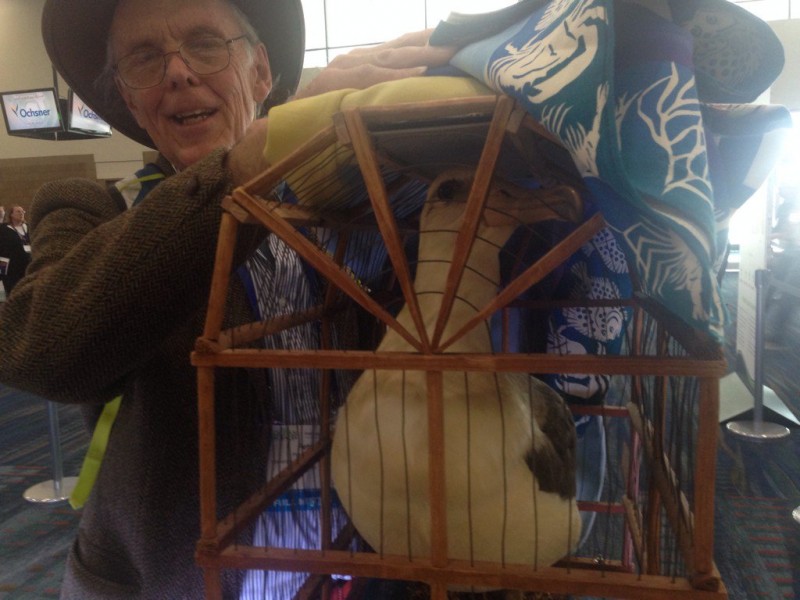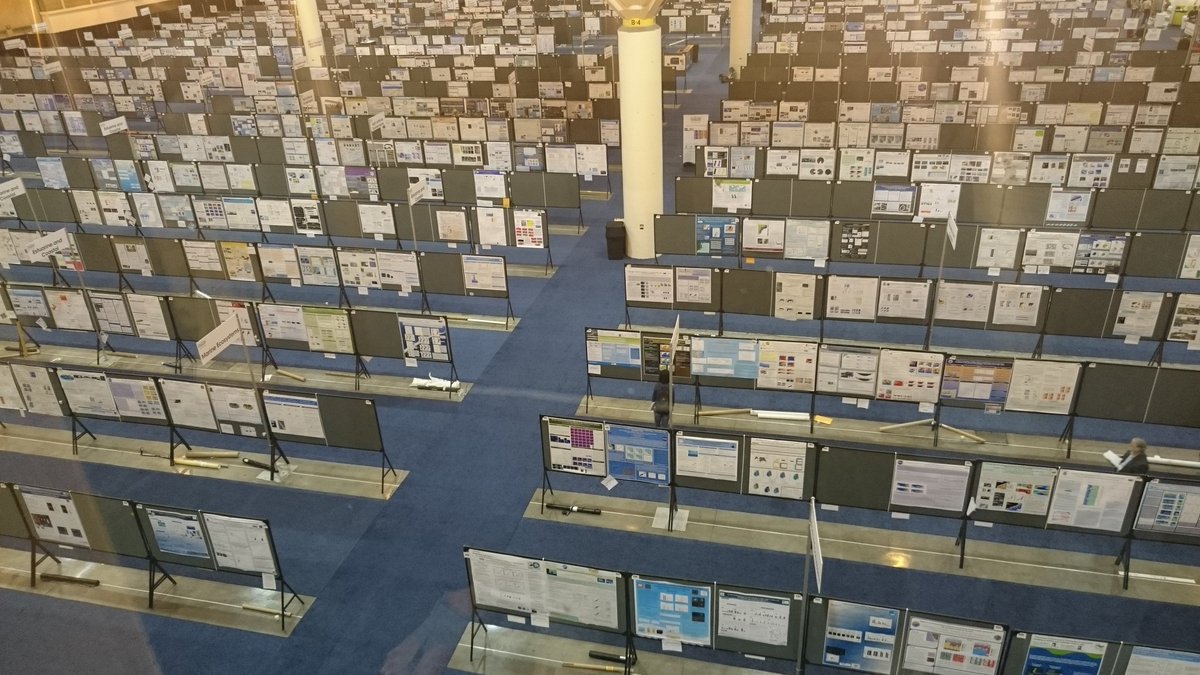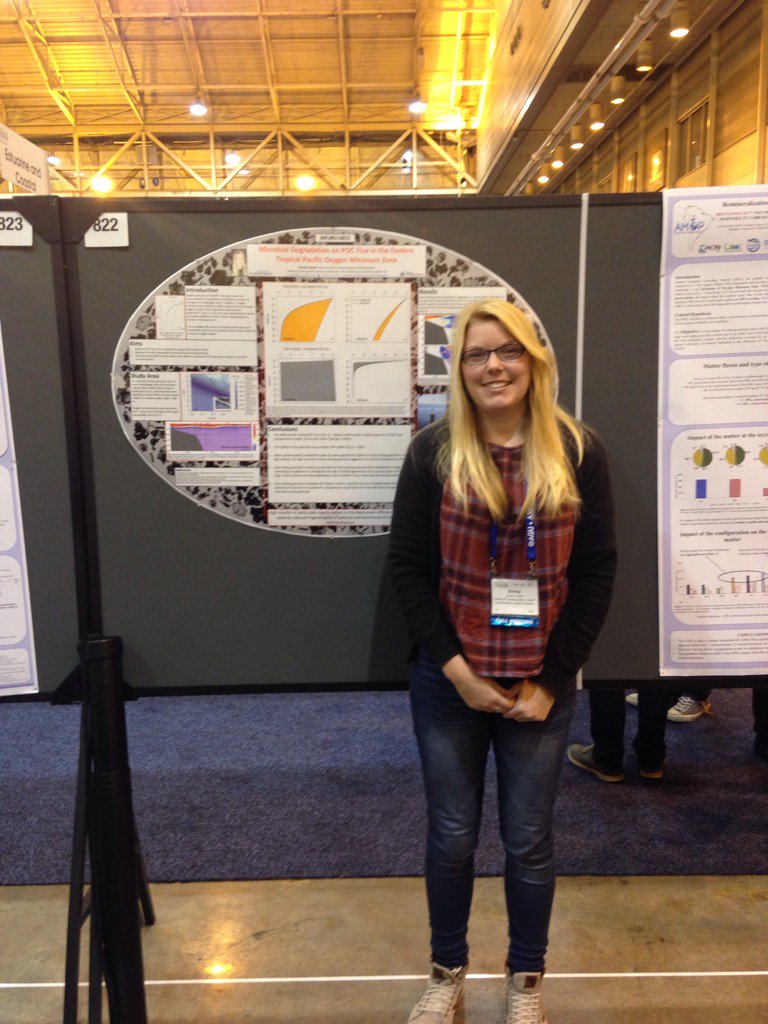Ocean Sciences 2016: New Orleans
Emma Cavan
NOCS

Thanks to the Challenger Society I was able to spend last week (end of February) in New Orleans, or NOLA as the locals call it, at the Ocean Sciences conference. This was my first time at this enormous international conference and it was a very exciting experience. It was kicked off by a plenary by Lisa Levin on oxygen minimum zones, which was very relevant to the work I was presenting there. This was followed by a drinks reception with a brass band, including a massive tuba, circulating through the crowds with a following of enthusiastic dancing conference participants. We anticipated that very few of these were British!
Once the conference officially began its vastness was easily appreciated. The poster hall was massive, containing over 3000 posters. At this point I was glad I had made mine stand out from the crowd. I can’t claim the idea was mine but I decided to take an oval-shaped poster (see picture) to the conference to draw people in, and I believed it worked! All of my 20 A4 hand-outs had been taken, plus some CVs, by the end of the week. This was the first time I’d presented a poster and it was a great experience to talk face to face with people about my work. As it’s almost ready to be submitted for peer-review I used this opportunity for people to, unknowingly, review my work!
As a biogeochemist the highlights for me were sessions on the biological carbon pump, nitrogen cycling and stoichiometry, plus getting to see the American ‘giants’ of the field present, which I wouldn’t usually see in the UK.
One of the plenaries was by Professor Corinne Le Quere (FRS) who actually streamed her talk from UEA. She spoke on the ocean carbon cycle and apparently UEA have a policy limiting excessive travel that contributes to increasing fossil fuels in the atmosphere. I think this is a great idea as it is somewhat ironic that thousands (> 5000) of climate scientists fly half way around the world to discuss our oceans and climate! I expect or at least hope we will see more scientists opting to follow suit in the future.
Although I didn’t fall in love with New Orleans, I did appreciate the tropical weather and I had a fantastic week catching up with non-UK colleagues, discussing science with so many people, furthering my current work and even discussing potential job opportunities! Thank you so much to the Challenger Society for this travel grant as I really wouldn’t have been able to make it without it. Bio: Emma is a final year PhD student at the National Oceanographic Centre, Southampton, where she also completed her Masters of Marine Biology degree. She studies the organic carbon cycle in the ocean, specifically sinking particles and how they are remineralised. This work has taken her on many cruises including to the Southern Ocean and equatorial Pacific. Emma has a passion for science-policy and took 3 months out of her PhD to work in the Royal Society’s Science Policy Centre. Other research interests include the application of the Metabolic Theory of Ecology and the presence of microplastics in the ocean. Outside of research Emma has been actively involved in organising events such as the Challenger Society’s 7th AMBIO conference held in Oxford, January 2016, and the Pint of Science festival in Southampton, 2015. Twitter style post: Thanks to @ChallengerSoc for the amazing opportunity to attend #oceansciences #osm16! What a fantastic week :)
Latest News
Marine Data Management, Governance and the MEDIN toolset
The Marine Environmental Data and Information Network (MEDIN) and OceanWise are delighted to invite you to attend our popular free online training workshop: ‘Marine Data Management, Governance and the MEDIN toolset’ on the 19th – 23rd of May 2025.
Workshop on the contribution of UK Arctic Ocean science to the International Polar Year 32/33
12:00 11th June – 16:00 12th June 2025: NOC Southampton (In-person with online option): Registration deadline 16th May
REGISTER HERE
Pre-meeting questionnaire (open to all)
The purpose of this workshop is for the UK Ocean Science community to discuss and then draft a prospectus document outlining the priority Arctic research questions the community would like to address during the run up to, throughout and beyond the International Polar Year 32/33. Additionally, to identify what unique strengths and technologies the UK has to help fill these knowledge gaps.
The second day of the workshop will be dedicated to writing groups, one for each of the priority research questions identified - from both the pre-meeting questionnaire (HERE) and day one discussion. By the end of the meeting, each group will have produced draft text and sourced supporting figures for the prospectus.
Post meeting, the draft will be opened for comments and suggestions from everyone, regardless of whether they were able to attend the workshop or not. It will then be shared with UK funders (UKRI, FCDO, DSIT, ARIA) and potential international programmes with whom we would like to collaborate (e.g. Arctic 2050, Norway). It will form a basis from which wider integration with terrestrial, atmospheric and cryosphere communities can be built, e.g. at the UK Arctic Science Meeting in September in Northumbria.
To ensure balanced community and ECR representation, and to ensure that the size of the writing groups is efficient and effective, if the number of registrations from individual institutes becomes overwhelming, we may contact individuals or teams and ask that each institute selects a smaller number of individuals to attend in-person. Please wait for confirmation of in-person attendance before finalising travel arrangements.
The workshop will be open to hybrid attendance and contributions on both days.
Challenger Society Council Position Vacancy
The Challenger Society for Marine Science (CSMS) are pleased to announce an exciting opportunity to support the next generation of ocean scientists and innovators. CSMS are looking for a new Council member to fill the Student Travel Awards and Stepping Stones Portfolio. The successful applicant will administer the travel and research grants available for Early Career Researchers.
The role involves:
- Receiving applications for the two schemes and responding to applicant inquiries
- Soliciting and compiling input from the rest of the Council for assessing the applications
- Communicating with successful and unsuccessful applicants for the two schemes
- Working with the Honorary Treasurer on allocating funds to successful applicants
- Following up with award winners on their reporting requirements
- Attending Council meetings four times a year (in person or online) and contributing to discussions and decision making for CSMS
The usual term for Council members is three years.
For more information about the CSMS Council, please follow this link: https://www.challenger-society.org.uk/The_Council
For more information about our Early Career Researcher grants and awards, please follow this link:
https://www.challenger-society.org.uk/Stepping_Stones
and
https://www.challenger-society.org.uk/Travel_awards
If you are interested in applying or have any questions regarding the role, please contact kathen@bas.ac.uk
